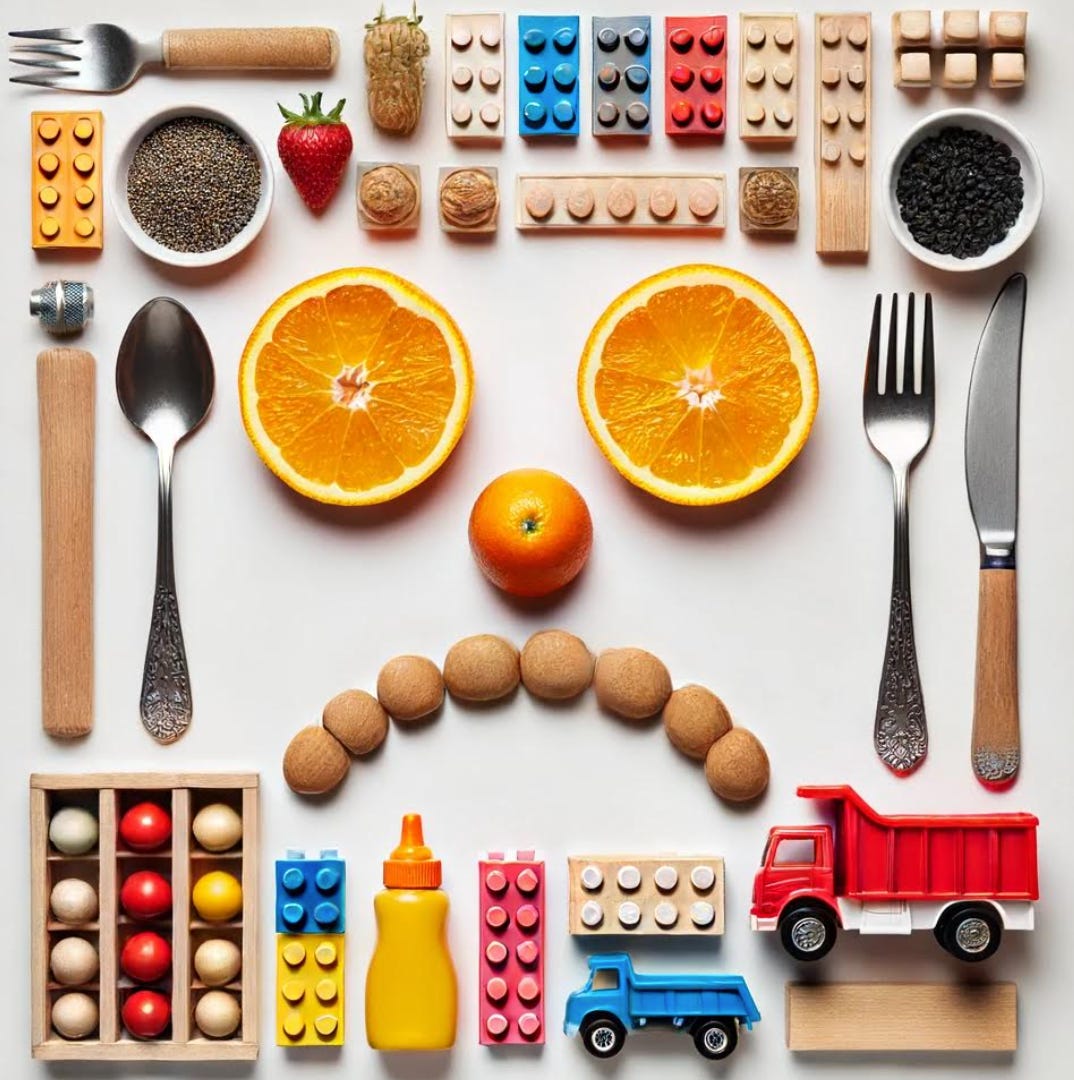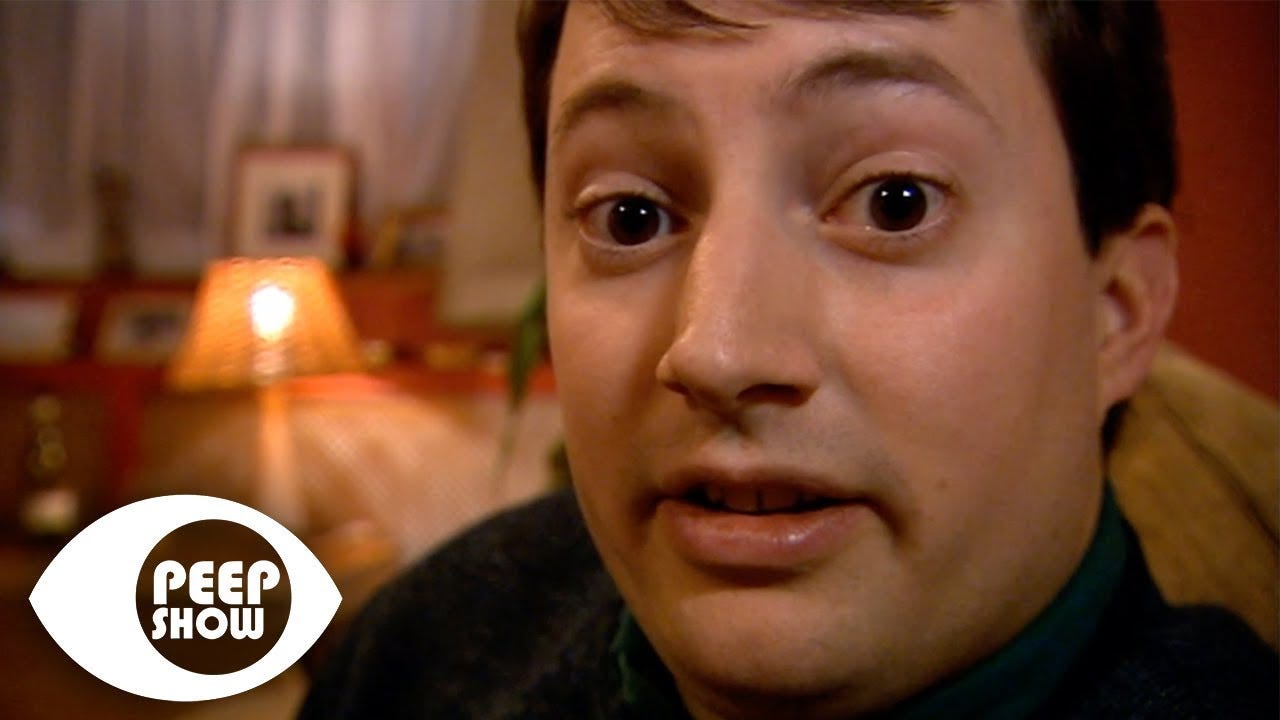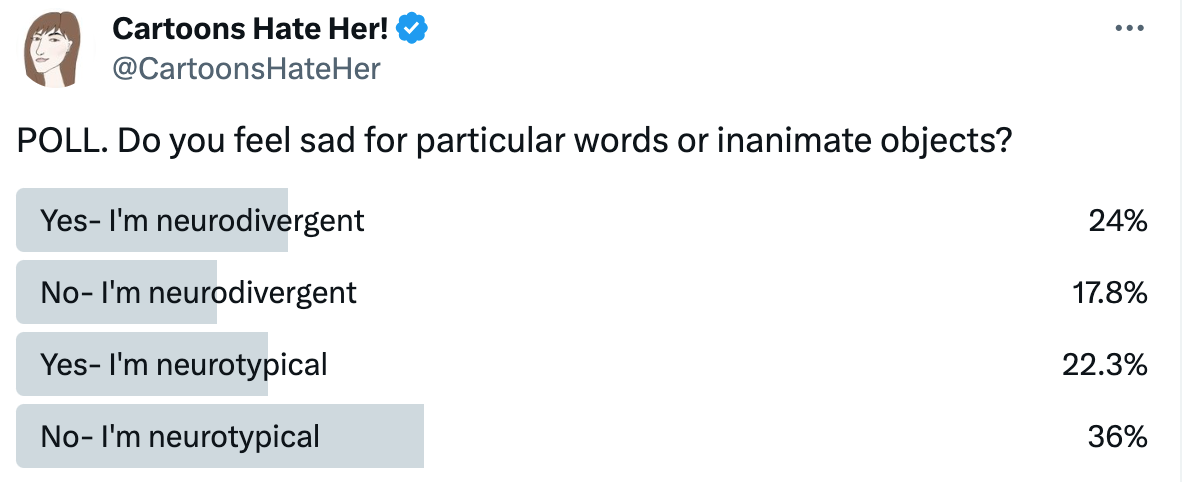The People Who Feel Bad for Words and Objects
Feeling empathy for socks that aren't worn enough...Or just the word "socks"?
One of my favorite shows is Peep Show, which I can only describe as a British 2000’s version of Seinfeld, told from the point of view of the main characters, including their unfiltered internal monologues. One of the main characters, Mark Corrigan, is a neurotic loan manager who, in internal monologue mode, mentions feeling guilty for wearing some pairs of boxers more than others. I first heard him say this in my early twenties, and I remember thinking, him too?
For all my life, I’ve felt for inanimate objects—and even words. Completely innocuous words have the power to bring me to tears. The first time I noticed this phenomenon, I was about three and learning the song “On Top of Spaghetti.” The plight of the “poor meatball” that rolled off the plate and onto the floor upset me so deeply that I couldn’t sing the song without crying. But, for some reason I can’t explain, I was drawn to the song and felt compelled to sing it through without crying, which my mom still talks about. I would sing, break into tears, compose myself, and vow to try again, over and over. To this day, I feel a little sorry for all meatballs and the word “meatball” makes me a bit sad. I mentioned this on Twitter and found out that I wasn’t alone:
However, part of what made this sad was that the poor meatball actually did endure a tragic fate, so the sad connotation comes from somewhere sort of logical. But the phenomenon of feeling bad for words and objects goes beyond the semi-reasonable.
My first true inexplicable sadness for a word was when I was four and taking part in some kind of preschool musical. There was a song in Spanish which involved all of us saying the word “peel” repeatedly (apparently this is what Spanish chickens say—their version of cheep? Spanish speakers are free to correct me.) In any event, I refused to take part in the musical because the relentless onslaught of “peel” was making me inexplicably sad. This was before the era of Montessori gentle parenting, so my teachers threatened me with a time out if I didn’t say “peel.” So I said it—through tears.
Somehow, the “-eel” sound stuck with me and even as an adult, I find some words that end in “-eel” a bit sad. In fact, when my four-year-old son (who has the same issue, by the way!) asked about what I was writing and I told him I was writing about sad words, he immediately asked, “Are you writing about wheel and stuff?”
My son’s sad words are a bit different. He calls them “wacky words” and they generally encompass anything said with gusto—words like hooray, yippee, woohoo and the current “worst wacky word,” yee-haw. We first noticed it when he was about eighteen months old and would start crying when we read him books with those words in them, but he couldn’t yet explain what was going on. At one point, my husband saying “yum” at the dinner table made our son tear up, not in the “toddler meltdown” way but the way an adult might begin to cry while watching an emotional film.
But—like me with the meatball song—my son is drawn to these words. When he has a book which mentions the words, he marks the pages that he deems “wacky.” He even catalogued “yee-haw” into multiple forms of yee-haw, and repeatedly asks me to write (but not speak!) the different versions of yee-haw on pieces of paper around the house (Example: Yee-ha, Yee-HAAAAAAW, Yee-Haw). His school allows him to bring personal belongings to class, and one time he brought a long strip of posterboard spelling out “yee-haaaaaaaw” but was horrified that his teachers said the word out loud.

I’ve seen this phenomenon described as something that happens to people with autism, but I don’t have autism, as I’ve written about before, despite people online frequently mistaking me for being autistic (I don’t really blame them.) My son also does not have autism (he has been tested.) I have ADHD, and he likely does too, which makes me wonder if sad words and objects are a “generally neurodivergent” thing. However, my husband, who has pretty severe ADHD, cannot relate.
A friend of mine (who, I should add, has ADHD but not autism) experiences sad words as well:
I’m realizing that sad words and objects are so much a part of my life that I don’t consciously think about them anymore. My favorite color is yellow, but the word “yellow” makes me a bit sad. Elephants, arguably one of my favorite animals, make me sad. The word “root” also makes me sad. Thinking about either of my parents as babies makes me extremely sad. I also feel bad for food that I decide not to order at restaurants. When both of my children were newborns, looking at objects that belonged to them made me sad, but looking at the babies themselves did not make me sad. My son’s bouncer chair still makes me sad, not because it’s a reminder that he’s growing up and no longer uses it but because the chair in and of itself is heartbreaking to me.
What’s even more bizarre about this is that I don’t always get sad about things that actually are sad. I’ve watched movies that other people have described as heartbreaking or disturbing, and didn’t have much of a reaction. I also have an uncontrollable impulse to laugh in upsetting situations, usually when I see someone getting in trouble. This started as a child when other kids would get hurt on the playground or yelled at, and at the time my mother thought I was genuinely taking pleasure in their calamity (and no doubt probably thought I was a sociopath), but it’s truly uncontrollable and decoupled from my emotions. I don’t want to laugh, and I don’t think it’s funny. Although we generally practice “gentle parenting” in our household, I witnessed my husband sternly reprimanding our son for throwing red hibiscus tea all over the kitchen floor. He said, in a completely serious tone, “Look at this- you got tea all over Buzz” and held up a magenta-soaked Buzz Lightyear toy. I had to excuse myself. (Arguably this actually was a bit funny, but I think I would have had the laughing impulse regardless.)
I’m not sure if the uncontrollable laughing falls into this category, but I’ve seen the personification of words and objects referred to as a type of synesthesia. I actually do have synesthesia, in the sense that as long as I can remember I’ve associated numbers and letters with certain colors. When I learned to play guitar and piano, particular chords also developed their own colors (E Minor is definitely green, C Major is yellow! AAAH, yellow *cries*)
I asked my Twitter followers if they could relate to this phenomenon, but also whether they were neurodivergent enough, figuring this would cover both autism and ADHD. It looks like it might be slightly more prevalent among the neurodivergent, but is hardly a neurodivergent phenomenon. A lot of people can relate to this! And to think I spent thirty years of my life thinking it was only me!









I’m totally the same way! Especially if an object is anthropomorphized in some way. This frozen yogurt place I went to had spoons that were printed with “My journey is just beginning. Recycle me.” I COULDN’T throw them away. I don’t know if they survived the purge that went along with moving to our new house, but wherever they are, I hope they’re thriving.
The song could have been “de colores,” which includes the line “los polluelos, con el pio pio pio pio pi”, meaning “the chicks, with their cheep cheep cheep cheep”.